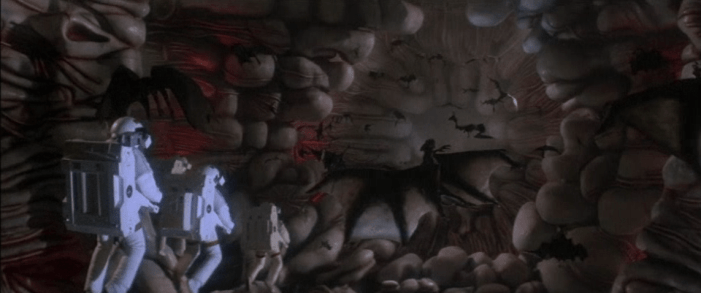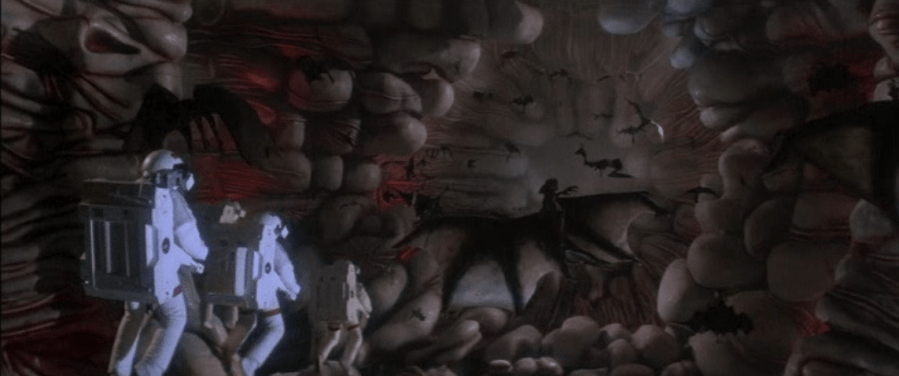Lifeforce. 1985. Directed by Tobe Hooper. Screenplay by Dan O’Bannon & Don Jakoby, based on the novel by Colin Wilson.
Starring Steve Railsback, Peter Firth, Frank Finlay, Mathilda May, Patrick Stewart, Michael Gothard, Nicholas Ball, Aubrey Morris, Nancy Paul, & John Hallam.
Golan-Globus Productions/Easedram Limited/London-Cannon Films
Rated R. 116 minutes.
Action/Horror/Mystery/Sci-Fi/Thriller
★★1/2
 Tobe Hooper’s filmography is packed with interesting entries. Some are classics, like The Texas Chainsaw Massacre, Poltergeist, The Texas Chainsaw Massacre 2, and The Funhouse. Then there’s the lesser, still fun fare, such as the sloppy Spontaneous Combustion, or bonkers stuff like Eaten Alive and his cartoonish adaptation of Stephen King’s short story The Mangler.
Tobe Hooper’s filmography is packed with interesting entries. Some are classics, like The Texas Chainsaw Massacre, Poltergeist, The Texas Chainsaw Massacre 2, and The Funhouse. Then there’s the lesser, still fun fare, such as the sloppy Spontaneous Combustion, or bonkers stuff like Eaten Alive and his cartoonish adaptation of Stephen King’s short story The Mangler.
Someplace in the heap of movies Hooper’s gifted horror lovers lies Lifeforce, penned by Don Jakoby (Blue Thunder, Arachnophobia) and Dan O’Bannon (Alien, The Return of the Living Dead, Dead & Buried). A definite hot mess mixing horror, mystery, science fiction, and even a drop of romance, sort of, resulting in a strange slice of genre cinema.
Although this isn’t one of Hooper’s worst it’s not near his best, sitting around the middle of his talents. O’Bannon and Jakoby’s screenplay comes off strong in theme. The story and its plot(s) involve a spaceship tasked with observing Halley’s Comet up close, discovering human life forms in a weird vessel attached. When specimens are brought back to Earth this reveals a race of vampires bent on destroying humanity.
At its core, Lifeforce is the dark heart of all humankind’s anxieties about extraterrestrials. Our frail egos would be shattered if we found other intelligent life out there, particularly if it was more intelligent. It’d only be worse if they were also stronger and intent on our annihilation. As people, we’re worried another species might come along and treat us like we’ve treated the natural world— with utter disrespect and totally ignorant disregard. All because we’re content believing we’re at the top of the food chain, and we’re only comfortable when WE’RE the vampires.

“We’re a bit out of our depth here”
 Like other movies of its kind and apocalyptic stories in fiction, Lifeforce foolishly believes our biggest threat comes from another planet when we’ll actually be the end of ourselves. Either it’ll be those egos of ours, or our naive and endless curiosity— some things may be better left unknown, certain knowledge comes at a price.
Like other movies of its kind and apocalyptic stories in fiction, Lifeforce foolishly believes our biggest threat comes from another planet when we’ll actually be the end of ourselves. Either it’ll be those egos of ours, or our naive and endless curiosity— some things may be better left unknown, certain knowledge comes at a price.
The implications of the Space Race, which remain today, involve the possibility we’re not alone in the universe. More than that, what if, like in all these movies about angry aliens coming to Earth, contact means potential annihilation? These types of stories – and Lifeforce is no exception – imagine the various countries of the world coming together in order to face such an external threat, whereas in reality the world’s so divided it’s likely this wouldn’t be the case.
Above all, if whatever/whomever’s out there’s stronger and smarter, humans would be displaced. We’d no longer stand tall at the top of the evolutionary hierarchy as the most capable, autonomous beings. The only thing worse than being displaced is being replaced. The space vampires suck the life out of humans, taking on their form, like a virus using its host/its resources.
And they use human weakness against us. The men are all enthralled by the woman humanoid, to the point they’re disarmed into a “loss of control.” One sequence sees the naked woman loose and wandering, putting everyone on high alert. Except she mesmerises the men. Seems even in the face of extinction men will risk it all to look at a woman’s nude body. No surprise to Father Gore.

“Comets were once considered to be harbingers of evil …
one of the earliest words for comet was disaster, which in Latin means evil star.”
 Perhaps the biggest anxiety when it comes to a destructive species from outside our world is the worry they’ll mirror us in all the worst ways. In one scene, Dr. Hans Fallada (Frank Finlay) speaks of his study of thanatology – the study of death and the many physical, psychological, and social changes in its wake – and his concern with “what happens when we die” and “what happens after we die.”
Perhaps the biggest anxiety when it comes to a destructive species from outside our world is the worry they’ll mirror us in all the worst ways. In one scene, Dr. Hans Fallada (Frank Finlay) speaks of his study of thanatology – the study of death and the many physical, psychological, and social changes in its wake – and his concern with “what happens when we die” and “what happens after we die.”
What’s compelling about Dr. Fallada’s dialogue is his line: “In a sense we‘re all vampires.” He’s not wrong, either. We’re just as much vampires as those from space. Human beings suck Mother Earth dry of her resources, disrespecting the planet’s natural landscapes while it wastes away more each year.
Like vampires take the place of humans by draining their lifeforce, as do we humans drain the life from the Earth. We replace the natural world like the vampires do to the people in the movie by building our homes and shopping centres in areas where organisms live, displacing them, as well as displacing people, like First Nations tribes and other indigenous groups who lived on the land where capitalism now breeds like wildfire. The difference between the vampires and us is, as Dr. Fallada says, only “one of degree.” These space vampires drain the physical lifeforce of humans. We humans drain the literal lifeforce of the natural world, likewise sucking dry the psychological lifeforce of the people in it, too.
 While space exploration and the big Space Race to the moon itself aim at lofty human goals, the possibility of extraterrestrial life subverts the human notion we’re the only intelligent life in our universe the further we make discoveries. This ultimately wounds our ego, damaging our sense of human superiority. Suddenly we’re no longer the top class of the hierarchy and not the apex predators of the food chain simply because we have opposable thumbs and can use weapons. Neither are we the smartest, strongest, or furthest technologically advanced society.
While space exploration and the big Space Race to the moon itself aim at lofty human goals, the possibility of extraterrestrial life subverts the human notion we’re the only intelligent life in our universe the further we make discoveries. This ultimately wounds our ego, damaging our sense of human superiority. Suddenly we’re no longer the top class of the hierarchy and not the apex predators of the food chain simply because we have opposable thumbs and can use weapons. Neither are we the smartest, strongest, or furthest technologically advanced society.
Lifeforce pits the humans against vampires who, at heart, are nothing more than mirrors of our own species and the worst parts of us. The vampires exploit the weakness of humans because they know humans well— one vampire recognises another. Hooper’s movie plays out its themes about the anxieties of space travel/discovery well enough in certain scenes, then during others there’s too much contrived plot and not enough characterisation, leaving those themes hanging out to dry.
Hooper’s obviously done better. Lifeforce has its moments anyway. Definitely worth the watch if only for the look of the wretched humans after being drained by space vampires, as well as the opening sequence with the HMS Churchill spacecraft and the astronauts extracting the humanoid specimens. You won’t be extremely disappointed, especially if you put it on the watchlist for around Halloween. Can’t go wrong with a few vampires, even if they’re from space!

